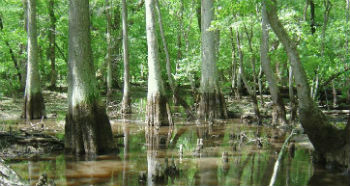RALEIGH — Amid closed-door budget fights, public spats and end-of-session maneuvering, environmental bills continue to chug along through N.C. General Assembly.
Last week, while tempers flared over budget negotiations, the long-awaited coal ash legislation passed the state Senate with unanimous support and the House approved its versions of a cluster of bills mandating a diverse set of regulatory changes.
Supporter Spotlight
 Gradie McCallie |
Some pieces of environmental legislation, including tighter rules on challenges to air quality permits and a statewide reduction of air quality monitors, remain in limbo as do many of the shellfish, inlet dredging and Oregon Inlet-related provisions embedded in the competing budget plans. Until those issues are settled, it’s too early to assess the legislature’s full effect on environmental protection.
Grady McCallie, policy analyst at the N.C. Conservation Network, said the record so far this year is mixed. For instance, a speed up of hydraulic fracturing for natural gas — a major, but somewhat expected defeat for environmental advocates — has been balanced by movement forward on coal ash cleanup, he said.
“Right now, there are a lot of bad ideas still out there,” McCallie said. “The final judgment of the session is really going to turn on what happens here at the end.”
Coal Ash Bill Advances
It was an aside that a year or two ago you might not have expected to hear. During final debate on Thursday, Sen. Tom Apodaca, R-Henderson, introduced an amendment to his coal ash legislation, noting it was requested by the Sierra Club and then mused aloud “I hope I get Legislator of the Year.”
He might.
Supporter Spotlight
In a little more than a week, Apodaca, chair of the Senate Rules Committee, pushed through an extensive rewrite of Gov. Pat McCrory’s Coal Ash Management Act that goes much farther than the governor in mandating cleanup schedules, reporting timetables and funding additional monitoring and oversight by the N.C. Department of Environment and Natural Resources. The bill also sets up a Coal Ash Management Commission to take the lead on developing rules and procedures for the cleaning up 14 sites around the state. One of the commission’s main tasks will be identifying which sites are the highest risk and priorities for cleanup.
 Protestors picket Duke Energy headquarters in Charlotte. Photo: AP |
Much of what’s in the plan has been welcomed and, in some cases, modified, by a coalition of state environmental and consumer watchdogs monitoring the legislation. Their main concerns remain what is not in the plan as well as any potential loopholes built into it.
Mary Maclean Asbill, a senior attorney for the Southern Environmental Law Center in Chapel Hill, said the bill is a major win for Wilmington and the three other communities named as priorities in the bill. The ponds at Duke Energy’s L.V. Sutton power station north of Wilmington are among those that the bill mandates must be cleaned up within 90 days. But for the rest of the state, she said, the bill doesn’t go far enough.
“The bad news is that it doesn’t clean up all the coal ash lagoons,” she said. Under the bill, prioritizing the remaining 11 sites, including those upstream of the coast, is left to the new commission.
“It basically says trust DENR and a group of political appointees,” she said.
As it stands, the bill also contains a loophole that would allow the company to deposit some of the ash in small, unlined landfills.
During debate, the politics of prioritizing sites emerged as senators questioned why just four sites are named as initial high priorities. Sutton and two other sites — the Charlotte-area Riverbend and Asheville power plants — were the subject of federal lawsuits by private groups that were preempted when the state intervened last year. The fourth site is Duke’s closed Dan River plant where a February spill triggered the focus on the ponds and lack of state oversight. As debate wound down Thursday, Senate leaders fought off a series of amendments demanding other sites be added to the priority list.
Asbill said it’s clear that as awareness grows legislators are hearing from more constituents demanding cleanup of sites in their districts. She said the bill is improving as it goes through the process and expects to some changes as it moves to the House this week.
One final amendment offered on the last day of debate repealed a change to state rules passed last year at the request of Duke Energy and chemical industry lobbyists. The rule change moved the state’s compliance boundary for groundwater contamination from 500 feet to the property line, allowing contamination to spread to other properties.
Asbill said polluters have abused the rule to avoid containing contamination. The new amendment returns the rule to the original 500-foot standard. The bill now goes to the House.
Air Quality, Wetlands in Limbo
 The fate of the coast’s isolated wetlands remains in limbo. Photo: U.S. Fish and Wildlife Service |
With the Senate and House both engaged in “rip and strip” tactics — ripping language from one bill to add to others and stripping out whole provisions — it’s difficult to track let alone predict the outcome of several pending environmental laws.
Two key provisions currently on hold would mean serious changes for air quality protection in North Carolina. One would make it much more difficult for people to challenge air quality permits and another would eliminate 77 out of 133 air quality monitors. They were contained in a Senate-backed environmental omnibus bill, but were stripped out in a new bill passed by the House. That bill, Amend Environmental Laws 2014, landed in the Senate clerk’s office on Tuesday and hasn’t moved.
So far the air quality provisions have yet to resurface anywhere. DENR announced its opposition to the elimination of the monitors earlier this month.
Both bill contain changes rules to protect so-called “isolated” wetlands pushed by homebuilders. The bills would greatly loosen state protection of these small tracts of wetlands that aren’t directly connected to a waterway. The state currently requires a permit for any development activity in isolated wetlands that are larger than a third of an acre east of Interstate 95 and a tenth of an acre west of the highway. The Senate bill would raise that threshold to an acre anywhere in the state while the House would keep the protections as they are now west of the highway.
Farm Bill Provisions
The Senate passed an amended House version of a major farm bill last week that includes a couple of provisions to watch as the House works on the measure.
 Mary Maclean Asbill |
Senators modified language keeping environmental complaints against agriculture operations a secret, allowing DENR to release the information only after the agency has ruled that the complaint is not frivolous or was filed in bad faith.
The provision’s backers argued it would prevent unfounded complaints and attacks on farm operations. McCallie said the bill leaves it up to DENR to police the public’s right to know and could even make it difficult for farmers to know if there is a complaint against them.
“The way it’s written now,” he said, “DENR wouldn’t be allowed to tell them.”
The farm bill — House Bill 366 — also includes a provision that appears aimed at a long-running dispute over ammonia emissions at Rose Acre Farm in Beaufort County. The provision strengthens language preventing the farm’s waste operations from being considered an unpermitted discharge into state waters.
Another provision in the bill heads off what was an attempt to remove the authority of local governments to regulate fertilizers. The original provision would have put all authority to regulate fertilizers under the N.C. Department of Agriculture and Consumer Services, but the new language, worked out in a compromise last month, allows local governments to continue to regulate fertilizers to enforce water quality standards and to comply with federal pollution discharge permits.
Budgets and Mini-Budgets
While they both provide similar amounts for inlet dredging, DENR funding and most other conservation programs, the House and Senate budgets vary in several key areas when it comes to the coast.
A large section of the Senate plan was devoted to planning for acquisition of Oregon Inlet and surrounding lands for a new state park, with $15 million in spending set aside should state and federal officials strike a deal. The Senate also expanded the governor’s emergency powers to repair coastal roads and bridges allowing the executive branch to conduct road repairs and even bridge expansions without obtaining environmental permits.
The House budget does not include the Oregon Inlet or emergency powers language, but it doesn’t leave Dare County untouched. To boost funding for the N.C. Clean Water Management Trust Fund, the House wants to see the state sell Jennette’s Pier, a popular tourist attraction in Nags Head.







